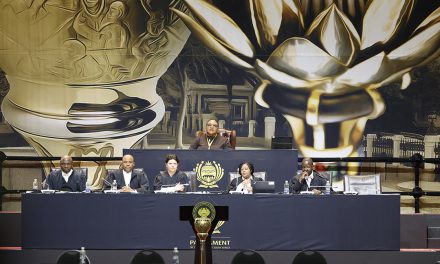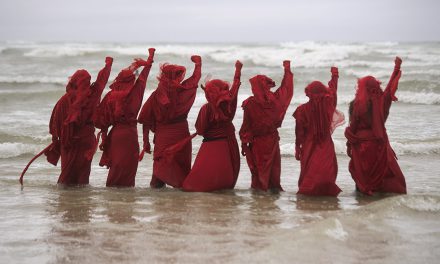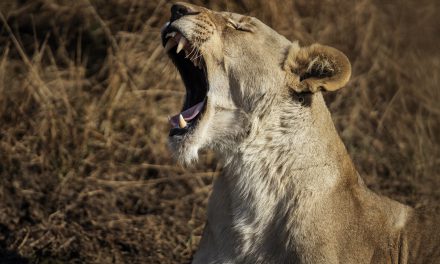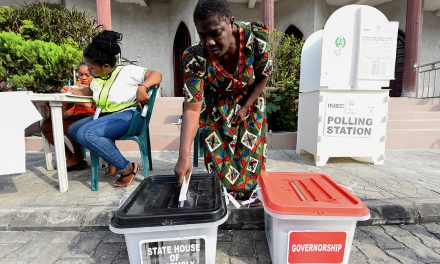A year ago, Good Governance Africa (GGA) released a press statement that Vladimir Putin was “fast escalating the kind of brinkmanship which history teaches us will lead to another world war if it is not skilfully contained … The repercussions of this behaviour are truly global, and the negative impact on African countries cannot be overstated.”
A year later, we do not (yet) have a world war, but African countries have been impacted severely by Russia’s unwarranted invasion of Ukraine. Many pre-Covid gains against poverty have been decimated, food security concerns have ramped up and inflation eats at any real wage gains made prior to 2020. It would have been a challenge to recover from the pandemic without further supply chain and global energy disruptions wrought by the war.
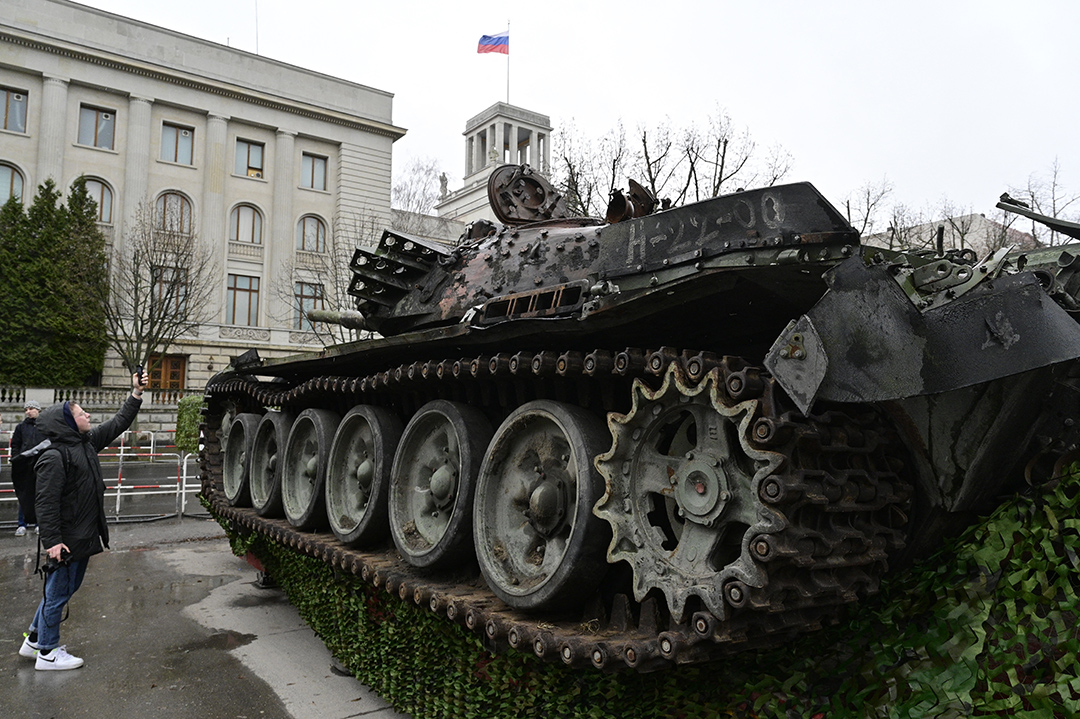
A woman takes a picture of a Russian T-72 tank destroyed in Ukraine placed in front of Russia’s embassy in Berlin on February 24, 2023, on the first anniversary of the invasion of Ukraine. The wrecked tank was placed as an art installation by the “Berlin Story Bunker” group in front of the Russian embassy as “a symbol of Russia’s downfall”. Photo: John Macdougall/AFP
Globally, GDP growth is expected to slow significantly in 2023. The Economist Intelligence Unit (EIU) forecasts “full-year recessions in Germany, France, Italy and the Netherlands, as well as in the UK”. Monetary tightening in the US will probably lead to economic stagnation there.
While this is relatively good news for keeping global interest rates stable, it does mean less demand for African products in key European and US markets. GDP growth in sub-Saharan Africa is forecast by the EIU at 2.9% for 2023. It does not help that South Africa’s growth forecast (by the EIU) – the biggest economy in southern Africa – is at 1.3%, as growth in the bigger economies typically drives growth in smaller, neighbouring countries. South Africa’s own Reserve Bank put the figure at a dismal 0.03%.
Moreover, the protracted war and China’s reversal of its disastrous zero-Covid policy will keep oil prices at upwards of $80/barrel until the end of 2024. This is temporarily good for the revenue basket of African oil-exporting countries, but oil wealth continues to show up in econometric regressions as strongly associated with underdevelopment. In other words, it is always a question of where the oil money lands up and what is done with it.
Invariably, in the absence of good governance, oil rents accrue to ruling elites whose incentive to build a broad tax base is essentially absent. Repression of citizens and co-optation of formidable opponents become easy options. Moreover, high oil prices ironically fund unsustainable fuel subsidies for imported fuel made from the very crude oil African countries such as Nigeria and Angola possess.
Not only will oil prices remain high, but grains and fertilisers will be difficult to access. These are key inputs for domestic food security and African countries continue to suffer the double burden of these high input costs and climate change impacts reducing food production.
It is not clear that Russia will continue implementing the grains deal that allows for the safe passage of food supplies out of Ukraine to global markets, especially as it comes under increasing sanctions pressure. Russia, of course, attempted to weaponise the EU’s dependence on its gas, but that policy has largely backfired, even though energy bills have gone through the roof.
Aside from the economics, the other major implication Good Governance Africa warned against was the geopolitical impact of Russia’s aggression: “Putin’s aggression has undermined the very fabric of a post-Cold War order that Russia has been integral to maintaining. Its actions make a mockery of the UN Security Council of which it is a permanent member. The fact that Putin has openly threatened the nuclear option is brinkmanship on a new level.”
African countries have become ripe for old Cold War rivalries to again manifest. Business Day wrote in an editorial last week: “When our navy sails into formation with a Russian frigate today, we are sending a series of clear messages to the world. The first is that we don’t care that the people of Ukraine are being bombed, kidnapped, raped and executed in mass killings. We’re happy to give the Putin regime a platform to project international solidarity on the anniversary of their illegal and inhumane invasion of a sovereign country.” The editorial found it difficult to explain this solidarity, even given the historical ties between the former USSR (ironically including Ukraine) and the ANC. Indeed, it would be very difficult to rationalise South Africa’s position in any kind of coherent foreign policy analysis terms.
The Financial Times reported that at a global security meeting in Munich, Germany, this week, the Namibian prime minister Saara Kuugongelwa-Amadhile said that Namibia was focused on “resolving the problem, not on shifting blame … the bottom line is that money used to buy weapons would be better used to promote development in Ukraine, in Africa, in Asia, in the EU itself where many people are facing hardships”.
But this is poor reasoning at best, as it creates a false dichotomy. It suggests that one can simply go on developing countries as if there is no war. It sounds ridiculous but clearly it must be said that Ukraine would find it immeasurably difficult to invest in “development” while its cities are being bombed.
The only plausible defence against continued Russian assaults seems to invest in weaponry that will repel it. It is not either “money for guns” or “money for development”; there can be no development until the guns stop and they clearly won’t stop if Ukraine just stops defending itself.
Most African countries who abstained (26 of the 54 nations) from the UN motions to condemn Russian aggression have argued, like South African international relations minister Naledi Pandor, that it is “simplistic and infantile” to think that international condemnation or calls for Russian withdrawal will change Putin’s mind. That seems to be missing the point. The Russian leader has hardly shown himself amenable to negotiation.
It remains the case that the African countries most likely to abstain from condemning Russia are those which import the highest volumes of arms from Russia as a proportion of total military equipment imports. This is the realpolitik of the situation and it seems to render leaders incapable of discerning strategic foreign policy errors.
A year on from Putin’s wrong-headed invasion of Ukraine, the world is in turmoil, the poor suffer the most, and African leaders seem unable to find a backbone to condemn Russia. In South Africa’s case, it plays naval games with the aggressor, and China, though its navy is sorely dilapidated. As the global geopolitical fault lines deepen, African countries seem to increasingly be at sea.
- This article first appeared in the Mail & Guardian on 21 February 2023.
Dr Ross Harvey is a natural resource economist and policy analyst, and he has been dealing with governance issues in various forms across this sector since 2007. He has a PhD in economics from the University of Cape Town, and his thesis research focused on the political economy of oil and institutional development in Angola and Nigeria. While completing his PhD, Ross worked as a senior researcher on extractive industries and wildlife governance at the South African Institute of International Affairs (SAIIA), and in May 2019 became an independent conservation consultant. Ross’s task at GGA is to establish a non-renewable natural resources project (extractive industries) to ensure that the industry becomes genuinely sustainable and contributes to Africa achieving the Sustainable Development Goals (SDGs). Ross was appointed Director of Research and Programmes at GGA in May 2020.


